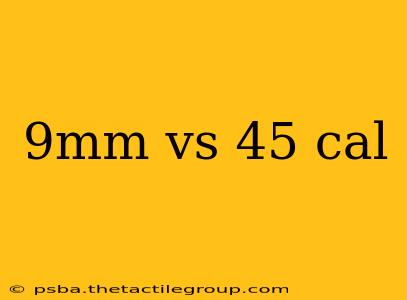Choosing the right caliber for your handgun is a crucial decision, impacting everything from self-defense effectiveness to recoil management and ammunition costs. This in-depth comparison of the 9mm and .45 ACP cartridges will help you make an informed choice based on your individual needs and priorities. We'll explore ballistics, capacity, recoil, cost, and more to provide a comprehensive understanding of these popular calibers.
Ballistics: Power and Penetration
The fundamental difference between 9mm and .45 ACP lies in their ballistics. .45 ACP boasts a significantly larger diameter bullet (0.45 inches compared to 9mm's 0.355 inches), resulting in a larger wound cavity upon impact. This larger cavity can lead to faster incapacitation due to greater tissue damage.
However, 9mm cartridges generally offer higher velocity, meaning they travel faster and penetrate deeper. This deeper penetration can be advantageous in self-defense situations, especially when facing threats behind cover. The increased velocity also contributes to flatter trajectory, making accurate shots easier at longer ranges.
Key Ballistic Differences:
| Feature | 9mm | .45 ACP |
|---|---|---|
| Bullet Diameter | 0.355 inches | 0.45 inches |
| Velocity | Generally higher | Generally lower |
| Penetration | Generally greater | Generally less |
| Wound Cavity | Smaller | Larger |
Capacity: Rounds per Magazine
Handguns chambered in 9mm typically hold significantly more rounds per magazine than those chambered in .45 ACP. This higher capacity offers a tactical advantage, allowing for more shots in a self-defense encounter before needing a reload. The difference in magazine capacity can be substantial, with some 9mm magazines holding upwards of 17 rounds, while .45 ACP magazines often max out around 10.
Recoil: Managing the Force
.45 ACP generally produces significantly more recoil than 9mm. This increased recoil can make it more challenging for some shooters to control, especially during rapid firing. The heavier recoil can also lead to faster fatigue, impacting accuracy and overall shooting performance. 9mm's lighter recoil allows for quicker follow-up shots and better accuracy, particularly for less experienced shooters.
Cost: Ammunition Expense
Both 9mm and .45 ACP ammunition are readily available, but 9mm generally comes at a lower price point. This cost difference can become significant over time, especially for those who practice regularly or consume large amounts of ammunition.
Choosing the Right Caliber: Considerations for You
The "better" caliber depends entirely on your individual needs and preferences.
Consider the 9mm if:
- Higher capacity is a priority.
- Less recoil is important for comfortable shooting and faster follow-up shots.
- Lower ammunition cost is a major factor.
- Greater penetration is needed.
Consider the .45 ACP if:
- Stopping power is your primary concern, prioritizing immediate incapacitation.
- You prioritize a larger wound cavity over penetration.
- Recoil management isn't a significant issue for you.
Conclusion: Informed Decision-Making
Ultimately, the best caliber for you is subjective. The information provided here aims to illuminate the key differences between 9mm and .45 ACP, empowering you to make an informed decision based on your individual needs and shooting experience. Consider testing both calibers at a shooting range to determine which one feels more comfortable and effective for you. Remember, responsible firearm ownership includes proper training and safe handling practices.

